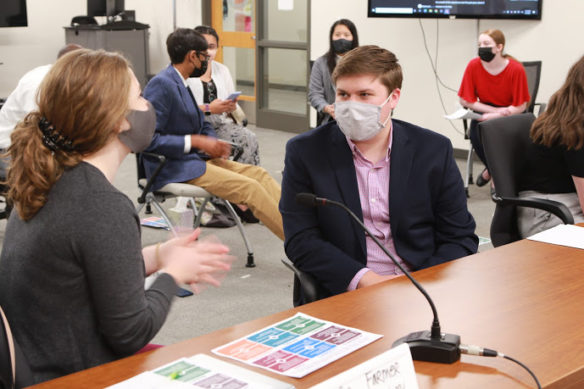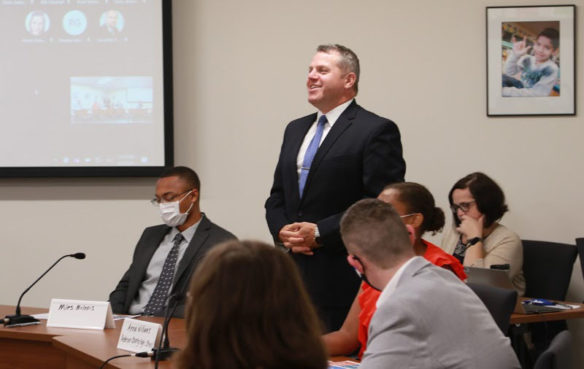
Sofie Farmer, left, a recent graduate of Gatton Academy, speaks with fellow council member Logan Justice, a junior at Paul Laurence Dunbar High School (Fayette County), during the June 1 Commissioner’s Student Advisory Council meeting.
Photo by Jacqueline Thompson, June 1, 2021
- Results from the roundtables will be compiled and the student advisory council will provide a report and make recommendations at an education summit that will be held in the fall.
- Education Commissioner Jason E. Glass introduced an activity for the student members to discuss what schools should “amplify, hospice and create” as education enters a post-pandemic world.
By Jacob Perkins
Jacob.perkins@education.ky.gov
Kentucky will host a series of roundtables aimed to address mental health in the state’s public schools, Lt. Gov. Jacqueline Coleman announced during the June 1 virtual meeting of the Kentucky Department of Education’s Commissioner’s Student Advisory Council (SAC).
Coleman – who also serves as secretary of the Education and Workforce Development Cabinet – met virtually with the students and asked them to partner with her office to lead several student mental health roundtable discussions.
These events will be held regionally across the Commonwealth after students return to school, Coleman said. Results will be compiled and the SAC will provide a report and make recommendations at an education summit that will be held in the fall.
Roundtable locations, dates and times will be announced at a later date.
“The Beshear-Coleman administration is education first,” Coleman said. “This includes caring holistically for each student. We know the pandemic has greatly affected the mental health of many K-12 students. The adults will be there to listen and learn.”
After the council makes its recommendations, Coleman said her office will work with school officials, community partners and state government to implement strategies to improve student mental health.
“We want to make sure that we really get to the heart of some of these challenges and that we work toward creating real, substantive policy solutions,” she said.
Along with the report from the SAC regarding student mental health, the education summit this fall also will feature the findings from Kentucky Coalition for Advancing Education (KCAE).
The coalition, which was developed to find themes from Education Commissioner Jason E. Glass’ recent virtual listening tour, will bring diverse perspectives together to co-create and co-design policy recommendations. KCAE members will collaborate to build new tools, systems and approaches for education in the Commonwealth.
Coalition membership consists of various groups within the state’s education community, including students.
“We place a high value on thoughts and opinions and perspectives of our students as we make decisions about what we do with education in the state,” Glass said. “Your voices really do matter. We’re always looking to elevate that and to show people just how tremendous young people in our state are.”

Education Commissioner Jason E. Glass, standing, speaks with the Commissioner’s Student Advisory Council during its June 1 meeting. Council members could meet in Frankfort or join the meeting virtually.
Photo by Jacqueline Thompson, June 1, 2021
‘Amplify, Hospice, Create’
Glass introduced an activity for the student members to discuss what schools should “amplify, hospice and create” as education enters a post-pandemic world. The activity is the creation of a professor at the Harvard Graduate School of Education and prompts people to think about what a post-pandemic world should look like: what things we should keep, what things we should let go of to create space and what new things are needed.
The students agreed that throughout the pandemic, schools did an excellent job of organizing assignments. In the future, schools could amplify, or strengthen, the use of virtual learning platforms.
“With things like Google Classroom, we were able to see what assignments we had to do by when and it was a lot more clear,” explained Rohin Dutt, a junior at duPont Manual High School (Jefferson County).
Additionally, students praised the flexibility of their schools and districts. Due to the ever-changing nature of COVID-19, schools had to transition between virtual and in-person learning. When the virus first began to impact Kentucky’s public schools, not all of the state’s districts participated in the Non-Traditional Instruction (NTI) Program.
Wallace Caleb Bates, a recent graduate of Breathitt County High School, said virtual learning provides students who may be homebound with an opportunity to experience a “normal education.”
Delaney Daugherty, a junior from Butler County High School and a new SAC member, echoed this sentiment.
“My brother is actually immunocompromised, and he found this year to be one of the best school years he’s ever had,” she said. “I feel the greatest thing to come out of this is students are excited to learn.”
Regarding items to hospice, SAC members wanted to leave behind the traditional class structure.
“A lot of time (virtual classes) started off with listening to a lecture for 50 minutes just as we would in an in-person class,” said Sofie Farmer, a senior at Gatton Academy. “It was really ineffective online and was still ineffective in person.”
Farmer suggested putting a cap on how long teachers could lecture and using the remaining class time focusing on other methods of instruction.
Going forward, SAC members said they would like to see schools create stigma-free spaces for students, teachers and other education community members so individuals can feel comfortable addressing mental health issues.
“We know it’s a need, but how do we make mental health outreach accessible to everyone and stigma-free?” said Drake Calhoon, a sophomore from Calloway County High School.
Council members also called on schools to use innovative methods to rethink education in the Commonwealth.
“Don’t be scared to push the needle to rethink the education system,” said Logan Justice, a junior at Paul Laurence Dunbar High School (Fayette County). “… Don’t create your thought of a good student, because we’re all different. We all have different, unique abilities, skills and talents. Don’t create a school system based on one mold of a student.”
Equity Project
Anastasia Panaretos, a sophomore at South Oldham High School (Oldham County), and Thomas Woods-Tucker, KDE’s chief equity officer and deputy commissioner in the Office of Teaching and Learning, presented the students with an equity video, which features many council members.
In the video, the students, alongside Tucker, explain the difference between equity and equality, as well as provide ideas for districts to consider when providing equitable services for all students.
“Students in eastern Kentucky have dealt with the ramifications of inadequate broadband infrastructure and students in the west end of Louisville have questioned whether or not their life matters,” Bates said in the video. “The broad range of equity issues exists in communities across Kentucky, in places like Bowling Green, Covington, Crab Orchard and Lexington, too. From as far west as Hickman to as far east as Pikeville, but that does not mean the issue is too large for us to fix.”
A completed version of the equity video will be presented to the Kentucky Board of Education at its June 2 regular meeting.
The video is part of a larger equity project that includes a podcast and newspaper articles. The goal is to create free resources KDE can distribute to Kentucky schools that will help them create an environment where students, no matter their race, gender, ethnicity or ability, can receive the same education and respect as the majority of the student population.
In other business, the council:
- Welcomed the 18 new council members for the 2021-2022 school year;
- Participated in an activity to explore the development of education policy from idea to implementation with Meredith Brewer, KDE’s director of educational policy, and Chuck Truesdell, the department’s director of government relations; and
- Discussed KDE’s ongoing initiatives to ensure equity in Kentucky public schools, including the Kentucky Academy for Equity in Teaching, a statewide initiative to recruit and retain a more diverse workforce of teachers.




Leave A Comment